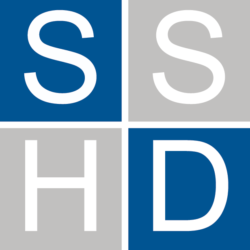Researcher's Window: Taking closer look at research and experiences of SSHD members
This month we are getting better acquainted with the research of Dr. Mona Abo-Zena, Assistant Professor of Early Childhood Education and Development in the College of Education and Human Development at the University of Massachusetts Boston.
1. What drew you to do work in human development?
I took an indirect route to studying human development formally. I began my professional career as a teacher and administrator in a range of PK-12 educational contexts. I had never taken a human development course. Having grown up as a Muslim-American daughter of immigrants in a small town in Iowa, I was keenly aware of the importance of creating a learning context for my students where they felt validated. My teaching then and now is grounded in critical multicultural scholarship and inclusive practices. Although through my applied work I acquired a decent working understanding of children and adolescents, I did not realize how little I knew about human development until I became a mother myself. Parenting premature twins, I was overwhelmed. Although I felt swamped, I also realized the privileges I have including my own level of education, socioeconomic status, legal status, and level of family support. When our twins started receiving services through early intervention, I had the opportunity and motivation to take child development courses. My first courses were so intriguing that they eventually led to my matriculation in a doctoral program in applied child development. Largely as a result of my own experiences, I strongly believe that all educators and others who work in human services study human development.
2. Did you have any mentor or a researcher who had substantial influence in your path or work? Is there a significant moment or story that capsulizes the nature of that influence on your scholarship or professional journey?
I am fortunate to have been sustained by a constellation of mentors to support the nuances of my interests and push me, both formally and informally. Throughout the majority of my doctoral studies, Dr. Ellen Pinderhughes scaffolded my learning and modeled for me how to participate in a holistic mentoring relationship. In our sessions, she welcomed conversations about my applied work (including parenting) and discussed how to navigate the academy as a woman of color with a strong commitment to social justice. Dr. Richard Lerner trained me to consider how to plan and work programmatically. Numerous other faculty at Eliot-Pearson Department of Child Development at Tufts University took an interest in me and my scholarship and contributed to my development in distinct substantive ways particularly Drs. Martha Pott, Fran Jacobs, George Scarlett, Chip Gidney, Jayanthi Mistry, and David Henry Feldman.
Although I enjoyed the honeymoon period of immersing myself in developmental scholarship, I quickly became critical of the largely de-contextual and non-inclusive methods and samples that provided its early foundation. Given my commitment to better understanding and promoting positive human development through studying it, I experienced a troubling level of dissonance. In particular, I could not reconcile the methods of human development that seemed resistant to the nuances of the lived experiences of the diverse individuals and groups I sought to better understand (e.g., religious minority, racial or ethnic minority, immigrant-origin, minoritized identities). In the darkness of this abyss, I was introduced to the landmark work by Cynthia García-Coll and colleagues (1996) on the developmental challenges and competencies of minority youth. The scholarship by Margaret Beale Spencer, particularly the 2006 Handbook of child psychology: An advanced textbook chapter Phenomenology and ecological systems theory: Development of diverse groups, explicitly enumerates major flaws of developmental scholarship. These scholars articulated many of the concerns I had felt. I found both affirmation and modeling of how to contribute to the scholarship while being critical of its weaknesses. I have grown immensely through the work of Barbara Rogoff, particularly through her book The cultural nature of human development (2003) and others in the sociocultural tradition that provided accessible examples and entry points to reflect and understand how culture and human development are intertwined.
While those mentoring relationships occurred indirectly through the real and complex interconnections between thinkers, text, and meaning making, I also had a transformative experience in my own professional journey. Feeling like an imposter early in my doctoral training because of my own minoritized identities coupled with the sense that my training as an educator was not valued in the research world, I was struggling to develop an integrated identity as a whole scholar and person. Within the human development field, the measures and previous research inadequately reflected my primary research interests on how religion and religious contexts affect immigrant-origin individuals and communities. I was presenting my first poster on these topics at an academic conference on immigrants where Carola Suárez-Orozo was a keynote speaker. After the keynote, I approached Dr. Suárez-Orozo to ask about why developmental scholarship on immigrant-origin youth seems not to include the role of religion in their lives. Carola listened carefully and validated my concerns indicating that developmental scholarship seemed decades behind other fields like sociology and political science that have long attended to the religious beliefs and participation of immigrants and their communities. Carola and I ended up continuing the conversation instead of our original plans of running to attend the next session. That conversation marked the point in my professional journey where I felt that reputable scholars perceived my potential contributions; in fact, they would later become collaborators in some of those contributions.
3. You have a range of important work, select 1-2 findings that you feel are key contributions to human development and describe those in brief.
Current project and/or key projects
Currently, I am synchronizing my teaching and applied research efforts with three projects focused on education and human development. Within higher education contexts, I am studying how students with diverse or minoritized identities navigate their educational contexts and contribute to their own development and to the environment and people around them. Looking more closely at the development of the college students themselves as they prepare to work with diverse children and their families, I have been focused on how to operationalize diversity and inclusion at personal, social, structural, levels in a range of professional contexts to support pre-service and in-service educators. Finally, in another action research project engaging families, community members, and educators in public schools, we are seeking to promote authentic conversations and reflections about diversity, inclusion, and biases as integral to reflective and equitable educational practices by all stakeholders. Still in incubation, I am developing a study of religiously diverse young children, families, and educators to help identify particular religiously-based cultural funds of knowledge.
Contributions of the projects/research to the study of human development.
In my research, I hope to contribute a person-centered focus that captures understudied populations, topics, and perspectives with ecological validity in order to represent regularities and variations in human development. In particular, through a range of studies, my colleagues and I have found that starting in early childhood, religious and other beliefs, practices, and doubts can serve as influential dimensions of personal development that intersect with other identities (e.g., race, ethnicity, gender, sexuality, immigrant status, ability) that must be studied through multiple methods. Some contributions of my developmental scholarship include the edited volume Transitions: The development of immigrant children (Suárez -Orozco, Abo-Zena, & Marks, 2015, recipient of the 2016 Social Policy Award for “Best Edited Book” from the Society for Research on Adolescence). I delved deeply into researching religion and human development in another edited volume Emerging adults’ religiousness and spirituality: Meaning-making in an age of transition that explored meaning making during emerging adulthood (Barry & Abo-Zena, 2014) and highlighted for me the promise of and need to involve emerging adults in more participatory manners in research on emerging adults (Abo-Zena & Pavalow, 2016). Perhaps the most reprinted product is an applied research project with kindergarten students and their families exploring their investigation of beliefs (renamed by the learning community because not everyone has a religious faith, but everyone has beliefs) and illustrating how young children have the capacity to explore their own beliefs and those of others (Mardell & Abo-Zena, 2010, recipient of a GOLD Excel Award by the Association Media and Publishing).
4. Your one wish for the study of human development
I really appreciate this question because it gives us an opportunity for reflective practice and to re-envision the field, hopefully in a more equitable manner with potential to address pressing problems. To achieve this, my wish for the study of human development is that it/we strive to be more humanizing, primarily through being more inclusive in our methods, sampled populations, and areas or topics of inquiry. For example, in recently completing a literature review on the experiences of young adolescent females navigating their experiences of menarche, I was disappointed to find that none of the leading developmental journals had published a study with this as a central focus for the last few decades. Relatedly, I wish that the field were more encompassing in what are considered highly regarded research designs and methods so that, for example, understanding the variety of individuals’ lived experiences would regularly be considered an indicator of rigor and validity.
5. A mentoring statement or quote you find most meaningful or life-changing
“Functionally, oppression is domesticating. To no longer be prey to its force, one must emerge from it and turn upon it. This can be done only be means of the praxis: reflection and action upon the world in order to transform it” (Freire, 1994/1970, p. 33).
About the researcher
Dr. Mona Abo-Zena is an Assistant Professor of Early Childhood Education and Development in the College of Education and Human Development at the University of Massachusetts Boston. On individual, social, and structural levels, Dr. Abo-Zena integrates research, theory, and practice to support the development of children and families with diverse experiences and backgrounds. Her research focuses on the role of religion and religious and spiritual development (broadly defined) as a way of knowing and being and as particular cultural funds of knowledge that affects development and learning, within an intersectional framework that includes other dimensions of identity and context. In addition, her research investigates how aspects of home-to-school connections affect student performance and development and how to better support pre-service and in-service teachers’ development and praxis. Mona draws on her background in sociology, education, and developmental psychology to advance her research and scholarship. She earned her B.A. in sociology from the University of Chicago, her Ed.M. from Harvard University, and her Ph.D. from Tufts University.
Edited and launched by Deborah J. Johnson & Yoko Yamamoto
SSHD Publicity Committee


